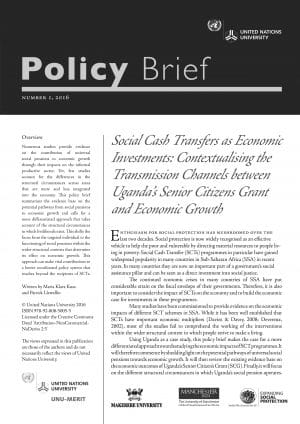
Numerous studies provide evidence on the contribution of universal social pensions to economic growth through their impacts on the informal productive sector. Yet, few studies account for the differences in the structural circumstances across areas that are more and less integrated into the economy. This policy brief summarises the evidence base on the potential pathways from social pensions to economic growth and calls for a more differentiated approach that takes account of the structural circumstances in which livelihoods exist. This shifts the focus from the targeted individual to the functioning of social pensions within the wider structural contexts that determine its effect on economic growth. This approach can make vital contributions to a better coordinated policy system that reaches beyond the recipients of SCTs.






